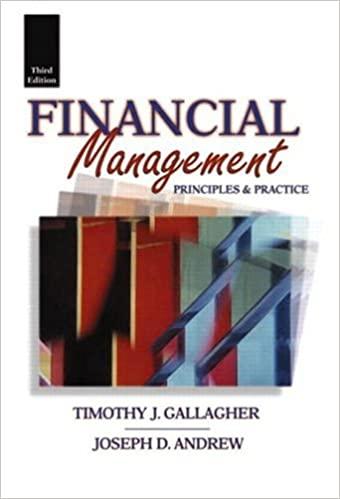
Sullivan-Swift Mining Company must install $1.8 million of new machinery in its Nevada mine. It can obtain a bank loan for 100% of the required amount. Alternatively, a Nevada investment banking firm that represents a group of investors believes that it can arrange for a lease financing plan. Assume that the following facts apply: 1. The equipment falls in the MACRS 3-year class. The applicable MACRS rates are 33%, 45%, 15%, and 7%. 2. Estimated maintenance expenses are $65,000 per year. 3. Sullivan-Swift's federal-plus-state tax rate 35%. 4. If the money is borrowed, the bank loan will be at a rate of 14%, amortized in 4 equal installments to be paid at the end of each year. 5. The tentative lease terms call for end-of-year payments of $250,000 per year for 4 years. 6. Under the proposed lease terms, the lessee must pay for insurance, property taxes, and maintenance. 7. The equipment has an estimated salvage value of $250,000, which is the expected market value after 4 years, at which time Sullivan-Swift plans to replace the equipment regardless of whether the firm leases or purchases it. The best estimate for the salvage value is $250,000, but it may be much higher or lower under certain circumstances. To assist management in marking the proper lease-versus-buy decision, you are asked to answer the following questions. a. Assuming that the lease can be arranged, should Sullivan-Swift lease or borrow and buy the equipment? Do not round intermediate calculations. Round your answer to the nearest dollar. Input the minus sign if the cost of leasing the machinery is more than the cost of owning it. Net advantage to leasing (NAL) is $ Sullivan-Swift should -Select- the equipment. b. Consider the $250,000 estimated salvage value. Is it appropriate to discount it at the same rate as the other cash flows? What about the other cash flows - are they all equally risky? We discounted it at the same rate, but it -Select- risky, so we should use a -Select- discount rate. By doing so, you -Select the value of the inflow in the last year in the cost of owning analysis. Sullivan-Swift Mining Company must install $1.8 million of new machinery in its Nevada mine. It can obtain a bank loan for 100% of the required amount. Alternatively, a Nevada investment banking firm that represents a group of investors believes that it can arrange for a lease financing plan. Assume that the following facts apply: 1. The equipment falls in the MACRS 3-year class. The applicable MACRS rates are 33%, 45%, 15%, and 7%. 2. Estimated maintenance expenses are $65,000 per year. 3. Sullivan-Swift's federal-plus-state tax rate 35%. 4. If the money is borrowed, the bank loan will be at a rate of 14%, amortized in 4 equal installments to be paid at the end of each year. 5. The tentative lease terms call for end-of-year payments of $250,000 per year for 4 years. 6. Under the proposed lease terms, the lessee must pay for insurance, property taxes, and maintenance. 7. The equipment has an estimated salvage value of $250,000, which is the expected market value after 4 years, at which time Sullivan-Swift plans to replace the equipment regardless of whether the firm leases or purchases it. The best estimate for the salvage value is $250,000, but it may be much higher or lower under certain circumstances. To assist management in marking the proper lease-versus-buy decision, you are asked to answer the following questions. a. Assuming that the lease can be arranged, should Sullivan-Swift lease or borrow and buy the equipment? Do not round intermediate calculations. Round your answer to the nearest dollar. Input the minus sign if the cost of leasing the machinery is more than the cost of owning it. Net advantage to leasing (NAL) is $ Sullivan-Swift should -Select- the equipment. b. Consider the $250,000 estimated salvage value. Is it appropriate to discount it at the same rate as the other cash flows? What about the other cash flows - are they all equally risky? We discounted it at the same rate, but it -Select- risky, so we should use a -Select- discount rate. By doing so, you -Select the value of the inflow in the last year in the cost of owning analysis







